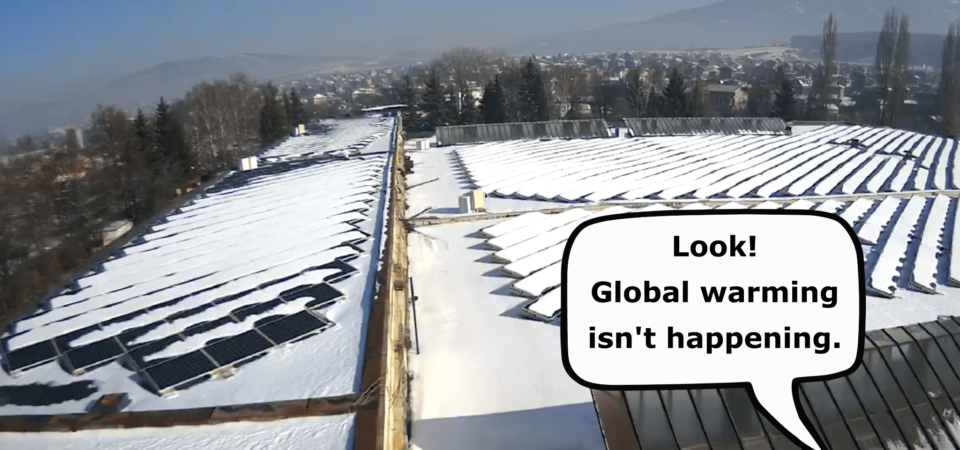At first sight the idea of a War on Facts may appear too strong. However, the consequences of denying climate change –and of questioning the worth of science in more general terms– are devastating. More than ever, we need to understand what is happening. There are various ways to approach the problem.
First, we should define what science actually is and what it is not. Among the wisdom to be found in Terry Pratchett is an explanation what science is:
“Science is not about building a body of known ‘facts’. It is a method for asking awkward questions and subjecting them to a reality check, thus avoiding the human tendency to believe whatever makes us feel good”.[1]
This could be the problem. Science is a confrontation with reality. Typically, it does not make us feel good. Who likes awkward questions? In regard to climate change, science shows us a grim reality, suggests that we should make sacrifices, and insists that unless we do the future will be worse. Except for a few masochists, maybe, no one likes facing the reality of environmental destruction. This goes so far that even climate scientists are often climate change deniers when it comes to their daily life. At least Bruno Latour says they are in his eloquent lectures Facing Gaia. A new enquiry into Natural Religion. The severity of reality also means that a whole guild of scientists is suffering from a exceedingly dark view of the future. In sum, looking at our life support systems is ‘too’ depressing.
An additional problem facing scientists –beyond our resistance to discomfort– is that everyday language and scientific language diverge from one another. There are huge barriers to communication. Populists frequently manage to negate the difference between beliefs and facts. The term ‘alternative facts’, for instance, is an excellent example of such denial. And while the populist claims to know stuff with absolute certainty, the scientist uses caution. Often the populist points at the importance of HIS opinion.
Yet, opinions do not matter in science. Earth does not care what we think. Things are happening, even if we do not want to believe in them.
Scientists are not always the most effective or entertaining speakers, and science does not appeal to enough people. The populist knows how to use language to make the crowd feel good about themselves, while the scientist might even make people feel worse. Again, who prefers awkward questions over great illusion? Facts about climate change surely make me sad. Populism is much sexier. It is not complicated, nor sad for its perpetrator.
It does not help that while populists are feeding off of crowds, scientists often find themselves disconnected from the public. Science can take place far away from the public eye. It may happen in a laboratory. The scientist might not be actively engaged with the public and might even think advocacy work is somehow ‘dirty’. Scientists might enjoy their subjects, but informing the public about dire predictions is anything but fun. The biblical figure Jeremiah, for instance, attempted to inform others of the consequences of sins. Instead of listening and changing, people continued and catastrophe followed. The scientist is amongst the many tragic prophets. We need to engage: listen and act. That is our only hope.
Finally, repetition is an important factor for belief.[2] This means that science can only stand a chance if it is constantly repeated. Everyone needs to be vocal about facts. Trump understands the mechanism. The silencing of the EPA is only one way that he can curtail ‘science’s agency’.
Humanity is driving environmental destruction, this is a fact. Yet populism is effective at disregarding facts by capitalizing on our resistance to discomfort, negating the difference between beliefs and facts, using language that feeds into what the public wants to hear, and shamelessly repeating it all. We need to recognize and learn from these tools perfected by the art of populism. Maybe some of them can even be turned around to champion science. The stakes are too high not to consider it.
We need to keep asking awkward questions loudly.
[1] Terry Pratchett, Ian Stewart and Jack Cohen 2014. The Science of Discworld: A Novel. Anchor, p. 90.
[2] Lewandowsky, S. et al. 2012. Misinformation and its correction continued influence and successful debiasing. Psychological Science in the Public Interest 13(3):106-131.
Didem Aydurmus earned a PhD in Political Science from the Graduate School of Social Sciences of Istanbul Bilgi University. Aydurmus’s recently published dissertation Survival despite the People: Democratic Destruction or Sustainable Meritocracy, is available through the MAHB Library.
The MAHB Blog is a venture of the Millennium Alliance for Humanity and the Biosphere. Questions should be directed to joan@mahbonline.org
MAHB Blog: https://mahb.stanford.edu/blog/war-on-facts/
The MAHB has shared additional resources considering how to confront the antagonism facing facts and science including:
How scientists should confront the antagonists | Robyn Williams with ABC Radio National’s The Science Show reports on comments by Gretchen Goldman, John Holdren, and Jane Lubchenco at the American Association of the Advancement of Science meeting in Boston.
Average people can make a difference on global challenges, says researcher | Caroline Newman with UVA Today speaks with Thomas Batemen to discuss the recent article Batemen published with Michael E. Mann in Nature Climate Change entitled The supply of climate leaders must grow.
What does the way forward look like for scientists? | An open thread for you to share your thoughts and experiences as advocates for science. You are encouraged to join the conversation!

